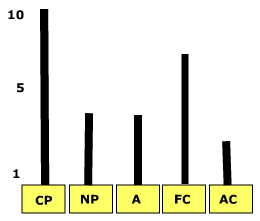|
Would you like to analyze yourself, and learn why you think and behave as you do?
You can learn what kind of person you are, and also about others to whom you relate.
You can do this by learning about egograms.
An egogram is an analysis which was created by John M. Dusay and is a diagram drawn intuitively
and based on our perception (or that of an outside person) of how we function
from our different ego-states or parts of our personality.
When we are unaware of these different parts of our personality, we are often not conscious
and are unaware of the way we are communicating and the positive or negative impact
we are having on others.
If we want to become effective helpers, then we need to become aware of the way(s)
in which we tend to communicate and seek to have more control over choosing
how we communicate.
You can draw an egogram to learn about yourself.
You begin by drawing five boxes horizontally beside each other.
Each box will represent one of the six ego-states as seen below.
Then, by asking and answering some questions, you can learn why you are like you are.
The results will describe the kind of person you are, and that they are.
Again, an egogram is the 5 ego states of an individual.
These five are are CP, NP, A, FC, and the AC.
They are described as follows:
The CP (Critical Parent) is critical, responsible, and uses words such as bad, should, ought, must,
always, ridiculous, bossy, demanding, and of course very critical and controlling.
The NP (Nurturing Parent) is sympathetic, protective, loving, helpful, very giving
and uses words like good, nice, love, and of course is very nurturing.
The A (Adult) is rational, logical, objective, practical, precise, and uses words like what, why, how, and when.
The FC (Free Child) has fun, plays, and is carefree, uninhabited, energetic, spontaneous, curious,
changeable, and uses words like wow, want, won’t, and hi!
T
he AC (Adapted Child) is adaptable, cooperate, complies, pleasing, placating, whiny, ashamed,
innocent, grateful, and uses words like try, wish, and, of course, would do anything to get along.
When I did egograms on husbands and wives, I did them separately.
I asked the first one not to tell the other what they said about themselves,
and the other one the same so that they would be more accurate in their view of themselves.
For example, I would do her egogram, and then, I would ask her to describe her husband’s ego states.
I would follow the same procedure with the husband at another session.
There are times that one of the other will describe how they would like to see themselves
instead of how they actually were.
I had a counseling session with a wife and a husband who I had known since they were in their teens.
I knew that the wife, who was the CEO in a corporation, was very accurate in the way she did her egogram
and her husband’s.
Her husband who owned his own business was very accurate in describing his wife,
but I knew that the way he did his egogram was inaccurate, but I didn’t comment to him
or his wife until the next appointment
I met with the wife, first.
We looked at her egogram, which was similar to how her husband saw her.
It was also how I saw her.
And then, I showed her husband’s to her.
She said, “If he was like that, we wouldn’t be here.”
He described his egogram as to how he would like to be.
As pastor, I knew most of our members -- I had been in their homes -- I had been with many
of them where they worked or in the business that they owned -- I had been with them in many
of their social activities, and on many other occasions.
So, I could do a fairly accurate egogram of most of them.
Knowing the different ego states, I would ask them questions as to how much they would
rate themselves as a CP for 1 to 10 being the most.
I would ask if they were very critical, controlling, demanding, bossy, and used other CP words
and behavior, then they would be very high -- maybe a 6, 7, 8, 9, or even a 10.
If not, I would suggest they were very low, and they would give me a number between 1 and 10.
Then, I would draw a graphic like the one below.
I gave each ego state a rating from one to ten -- of course, ten being the highest
and the most. (Some counselors use percentages such as 100% being the highest)
After the egograms are finished, I am no longer concerned about numbers.
My concern is about the levels of the ego states and how they compare with each other.
This Is an egogram:

After studying the egograms, I am ready to sit with the individual and enable him or her
to learn how to change.
As we go through this process, they can see for themselves what they need to change.
Changing involves an important principle of life that everyone knows and understands.
That principle is: “Whatever you give attention to, grows, and whatever you don’t give
attention to, diminishes.”
So, you give attention to the ego that needs to be increased, and give less attention
to that which needs to be lowered.
Look at the examples on the following page, and try to evaluate how the name below
the egogram describes the person.
You can go there by clicking on Egogram Examples on the left menu.
You can get more complete information from the book of the man who created egograms.
The book is Egograms by John Dusay and published by Harper & Row, 1977.
|